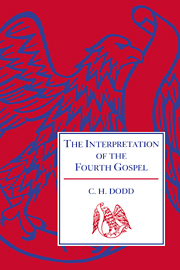Book contents
- Frontmatter
- Contents
- PART I THE BACKGROUND
- PART II LEADING IDEAS
- 1 Symbolism
- 2 Eternal life
- 3 Knowledge of God
- 4 Truth
- 5 Faith
- 6 Union with God
- 7 Light, Glory, Judgment
- 8 Spirit
- 9 Messiah
- 10 Son of Man
- 11 Son of God
- 12 Logos
- PART III ARGUMENT AND STRUCTURE
- APPENDIX: Some considerations upon the historical aspect of the Fourth Gospel
- Index Locorum
- Index Nominum
4 - Truth
from PART II - LEADING IDEAS
Published online by Cambridge University Press: 10 December 2009
- Frontmatter
- Contents
- PART I THE BACKGROUND
- PART II LEADING IDEAS
- 1 Symbolism
- 2 Eternal life
- 3 Knowledge of God
- 4 Truth
- 5 Faith
- 6 Union with God
- 7 Light, Glory, Judgment
- 8 Spirit
- 9 Messiah
- 10 Son of Man
- 11 Son of God
- 12 Logos
- PART III ARGUMENT AND STRUCTURE
- APPENDIX: Some considerations upon the historical aspect of the Fourth Gospel
- Index Locorum
- Index Nominum
Summary
Among the expressions used to denote the object of γνσι is άλήθεια viii. 32 γνώσεσεθετήν άλθεια καì ή άλήθεια έλενθερώσει μ. For a complete description therefore of the Johannine idea of the knowledge which is life eternal, we need to study the meaning of the term άλήθεια.
The adjective άληθήληθή is in its earliest and most constant usage applied to statements which correspond to the facts. Its contrary is Ψενή. It means ‘true’, ‘veridical’. This simple, normal, and fundamental use is common in the Fourth Gospel as in all Greek literature: e.g. x. 41 πáντα σα επεν ωáνη περ τōτōν ληθ ν iv. 18 ōōν ληθ. By an easy transference it is applied, in Greek literature after Homer, to persons who make such true statements, in the sense of ‘veracious’, and then in the extended sense of ‘sincere’.
It is a further extension of meaning when the adjective is applied to objects of experience, whether persons or things, which are in fact what they appear or purport to be. The sense here is ‘genuine’, ‘real’. This idea is in Hellenistic Greek more usually expressed by the adjective of secondary formation, ληθνó. Thus the astronomers apply this term to the real, as opposed to the apparent, risings and settings of the heavenly bodies, and Aristotle (Pol. in. 1281 b 12) speaks of àáληθνα, real objects, as opposed to á εανα, their pictured copies.
- Type
- Chapter
- Information
- The Interpretation of the Fourth Gospel , pp. 170 - 178Publisher: Cambridge University PressPrint publication year: 1953
- 1
- Cited by



